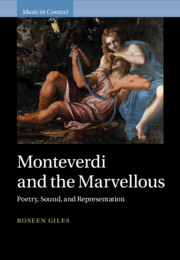
-
Select format
-
- Publisher:
- Cambridge University Press
- Publication date:
- 10 October 2023
- 28 September 2023
- ISBN:
- 9781009355384
- 9781009355353
- Dimensions:
- (244 x 170 mm)
- Weight & Pages:
- 0.68kg, 300 Pages
- Dimensions:
- Weight & Pages:
- Series:
- Music in Context
Book description
The marvellous, a key concept in literary debates at the turn of the seventeenth century, involved sensory and perspectival transformation, a rhetoric built on the unexpected, contradictory, and thought-provoking. The composer Claudio Monteverdi (1567–1643) created a new practice in which the expressive materials of music and poetry were placed in concert. This innovative new study of Monteverdi's literary personality integrates musical and poetic analysis to create an approach to text-music relations that addresses scholars of both literature and music. It illuminates how experiments in language and perception at the turn of the seventeenth century were influenced and informed by the work of musicians of that era. Giles provides a new perspective on the music and poetry of Monteverdi's madrigals through the poetics of the marvellous. In his madrigals, Monteverdi created a reciprocity between poetry and music which encouraged audiences to contemplate their interactions, and, consequently, to listen differently.
Reviews
‘[The book] is a substantial contribution to understanding the composer as an adept literary interpreter dialoguing with the aesthetics of his time. The book will serve an interdisciplinary readership well, especially enticing literary scholars, cultural historians, and musicologists and finding use in music and general academic libraries.’
Jonathan C. Ligrani Source: Notes: the Quarterly Journal of the Music Library Association.
Contents
Metrics
Altmetric attention score
Full text views
Full text views help Loading metrics...
Loading metrics...
* Views captured on Cambridge Core between #date#. This data will be updated every 24 hours.
Usage data cannot currently be displayed.
Accessibility standard: Unknown
Why this information is here
This section outlines the accessibility features of this content - including support for screen readers, full keyboard navigation and high-contrast display options. This may not be relevant for you.
Accessibility Information
Accessibility compliance for the PDF of this book is currently unknown and may be updated in the future.


